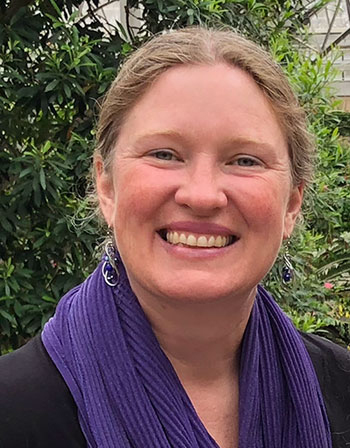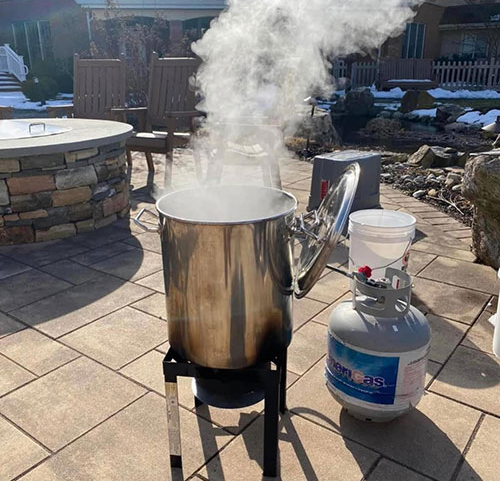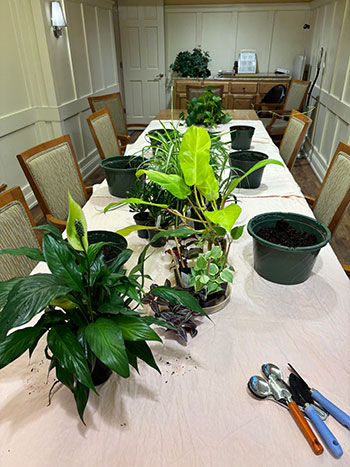
For Dawn Keller, Meadowood’s horticulturist, some of her earliest memories are the smell of tomatoes in her grandmother’s vegetable garden. “My grandmother was into gardening,” she says.
Keller felt the call of nature from a young age. “I was always interested in wildlife,” she says. “That led me to learning more about plants and their habitats.”
Her path to Meadowood’s active aging community wasn’t exactly a straight one. Keller originally attended Delaware Valley University in Bucks County to study veterinary medicine. At the school known for its agriculture curriculum, she couldn’t help but notice the impressive greenhouse and abundance of plants and gardens. “I was drawn into that,” she says. “I always had a million houseplants.”
In the late ’90s she switched to Temple Ambler, where she earned double bachelor’s degrees in horticulture and environmental studies. Before joining Meadowood, she held a variety of jobs related to her major: She worked in residential gardens, at a university, conducted research invasive plants in New Mexico and Colorado, and had a stint at a garden center.
“I’d driven past Meadowood so many times and I never realized the scope of the gardens and the landscape here,” Keller says. She has been at Meadowood for about 2½ years now.
While Keller may be hesitant as the focus of an employee spotlight, her enthusiasm as a nature lover is contagious. For the past four years, she has been tapping black walnut trees at her home to produce maple syrup. After telling her coworkers and Jeremy Schwenk, Director of Grounds, about her home maple syrup project, she sold them on the idea of doing it at as a campus nature project at Meadowood. (She didn’t have to do much persuading with Schwenk, who also taps trees at his home.)
Keller says you can produce syrup from any type of maple tree: walnut, hickory, birch, and sycamores. Under Keller’s guidance starting around Feb. 6, two trees were tapped on the Meadowood property. The trees were located on the walking trail, enabling many residents to observe the tapping. Keller also posted photos of the entire process.“It’s a pretty labor-intensive process,” Keller says. First, they had to make sure the temperatures were consistently below freezing at night and above freezing during day. Then they drilled about 1½ to 2 inches into tree, inserted a tree-saver spout called a spile, connected the spout with tubing, then put the tubing into a food-grade lidded to collect the sap.

She says one tree can produce close to 5 gallons of sap, which can take anywhere from overnight to a couple of days. That may sound like a lot of sap, but it takes 40 gallons of sap to make 1 gallon of syrup. The sap must be boiled down, she explains, because it consists of about 98% water.
Keller held a demonstration for residents, using — who’d have thought? — a turkey fryer. She says it takes about five to seven hours to boil down 15 gallons. Then came the long-awaited tasting for residents. Executive Chef Joe Sweeney, inspired by his frequent travels to Vermont, and Roy Patton from Grounds made shaved ice drenched in syrup. Despite the cold weather, many residents enjoyed the sweet treat.
Horticulture therapy is another passion of Keller’s; she teaches three classes a week, at Holly House, Laurel House and McLean Memory Care. “It’s just pretty amazing to see the residents” as they flourish, she says.
Many of these nature therapy activities are seasonal. In February residents prepared vegetable and flower seeds to plant in the gardens. Keller says the vegetables planted — such as carrots, beets, lettuce, and tomatoes — will be used in the dining facilities, mostly in McLean where the courtyard has raised garden beds. The residents seem to have more of an appetite when they are involved in the growing the food, she adds.
Other active aging activities included creating floral arrangements for Valentine’s Day. In the summer, residents will gather blooms and inspect them. And in the winter, students craft homemade bird feeders.

The horticulture therapy includes sensory activities: making lavender hand lotion (scent), and repotting plants (tactile), and floral therapy in the form of flower arranging (visual). Keller says these exercises not only help residents develop a green thumb but improve their mood, recall memories, and boost their confidence.
Keller is excited for new ways to get residents interested in plants and gardening, an activity that promotes active aging. She says Tracey Mullarkey, Director of Life Enrichment, recently purchased two indoor/outdoor rolling garden carts. Residents will have greater access to work in garden beds and reap the benefits of therapeutic gardening, Keller says.
Her work doesn’t stop with special projects. Keller is involved in staff care of residents’ gardens, upon request, for either seasonal or ongoing cleanup. She also works with grounds crew for overall upkeep at Meadowood. “We plant a lot of trees and shrubs,” she says proudly.


